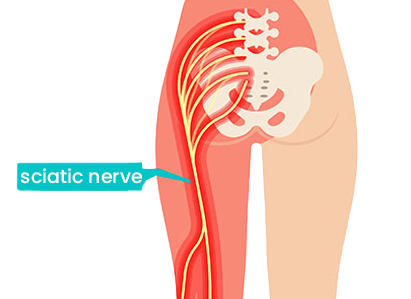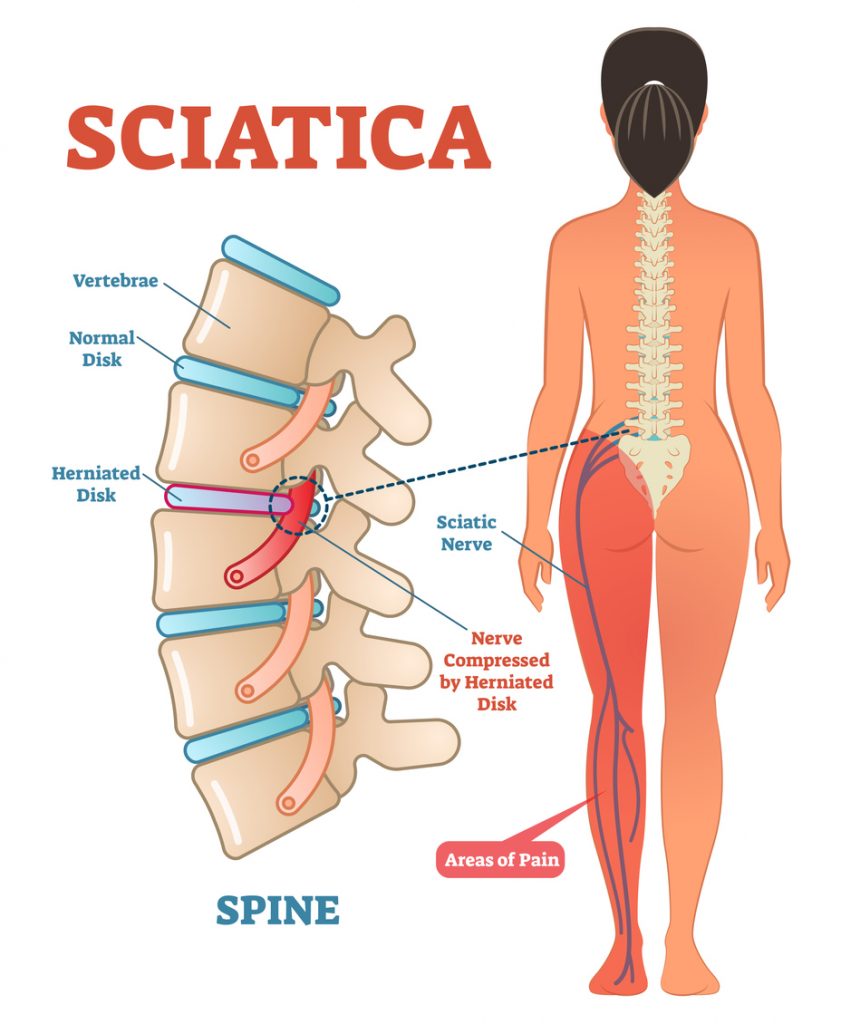Sciatica Treatment in Singapore
If you have radiating pain down your leg and wonder if chiropractic can help with sciatica, read on.

Sciatica Pain
SOLUTION FOR SCIATICA PAIN
What is sciatica?
The sciatic nerve, extending from the spinal cord to each leg, is the body’s longest nerve. Sciatica refers to the sensation of pain, numbness, tingling, or weakness along the nerve, affecting areas such as the hips, buttocks, and legs.
Sciatica is a symptom, not a standalone condition, resulting from pressure on the nerve, typically caused by conditions like herniated lumbar discs, spinal stenosis, spondylolisthesis, among others. Pregnancy is also a common cause of sciatica.
COULD I BE AFFECTED BY SCIATICA?
What are some symptoms of having sciatica?
You may encounter the following symptoms of sciatica:
Lower back pain extending to the back of leg
Weakness in the leg
Numbness and tingling in the leg
Shooting and sharp pain during walking
Increased pain when coughing or sneezing
Typically, only one side of your body is affected. If you experience shooting pain on both sides, it could be a case of bilateral sciatica.
Bilateral sciatica is exceedingly rare and may result from degenerative changes in the vertebrae and discs at multiple spine levels or serious conditions such as cauda equina syndrome.

DEALING WITH DIABETES
Sciatica or diabetic neuropathy?
TYPES OF PAIN
Do I have sciatica or lower back pain?
During a sciatica flare-up, the pain generally radiates from your lower back down your leg. The pain can be intense, especially during walking.
You might find sitting for extended periods challenging and experience pain when twisting, coughing, or sneezing.
In instances of low back pain, the discomfort typically does not extend below the pelvis.
LFCN VS SCIATICA
What sets apart meralgia paresthetica from sciatica?
Meralgia paresthetica results from pressure on the lateral femoral cutaneous nerve (LFCN). They both cause similar symptoms but have different root causes.
Meralgia paresthetica leads to thigh discomfort due to pressure on a nerve, while sciatica originates from the lower back and hips, extending down the leg. Prompt pain management is vital to prevent further nerve and muscle damage.
Visit our chiropractors for a thorough check-up and personalized care plan.
EXPERIENCING INTENSE PAIN
How can I determine if I am in the advanced stages of sciatica?
Sciatica can manifest as either acute or chronic, unlike diseases such as cancer, which have distinct stages.
Nevertheless, if you are enduring sharp or searing pain down your leg, facing difficulty flexing your foot (e.g., walking on your heels), or find it nearly impossible to walk without tears, it is crucial to seek immediate evaluation.
Delaying action may lead to significant damage, potentially necessitating more severe interventions in the future. This underscores the importance of addressing such conditions early on.
SCIATICA RISK FACTORS
Who is vulnerable to sciatica?
The primary cause of sciatica often stems from a herniated or slipped disk exerting pressure on the nerve root. This can result from maintaining an active or physically demanding lifestyle, carrying excess weight, or the general wear and tear of daily activities.
Here are some prevalent risk factors associated with sciatica:
Sciatica in individuals engaged in heavy lifting
Professions requiring consistent heavy lifting elevate the likelihood of developing back injuries. Apart from occupations involving heavy lifting, any physically demanding job or an active lifestyle can increase vulnerability to sciatica.
Sciatica due to sedentary lifestyles
Maintaining a sedentary posture can lead to joint dysfunction, contributing to spinal misalignment—especially when sustained over extended periods.
Sciatica linked to smoking
Research indicates that individuals who have been smoking for over 15 years face a higher risk of developing sciatica. This is primarily attributed to smoking-induced deterioration of spinal discs over time.
Sciatica during pregnancy
Contrary to popular belief that the increased weight during pregnancy is the main contributor to sciatic nerve pressure, the primary cause for many pregnant women experiencing sciatica lies in ligament loosening due to hormonal changes. This instability can lead to spinal misalignment and disc slippage.

CAUSES & SOLUTIONS
Sciatica in pregnant women
Sciatica occurs when the sciatic nerve is pinched due to spine compression, resulting in inflammation, numbness, and pain. Common causes include herniated discs or bone spurs.
Pregnancy can exacerbate sciatica due to hormonal changes and the expanding uterus, leading to increased pressure on the sciatic nerve. Lower back pain and sciatic issues are common during pregnancy, with symptoms often peaking in the third trimester.
Chiropractic care offers safe and effective relief for pregnant women experiencing sciatic discomfort.
Is chiropractic care safe for pregnant women?
Yes, it is. Regular chiropractic adjustments aim to realign the pelvis, creating more space for the growing baby and providing relief from sciatic and pelvic pain.
Discover additional insights into chiropractic care during pregnancy here.
MANAGING SCIATICA PAIN
How can sciatica be permanently alleviated?
While self-care treatments for sciatica found online can provide relief for some by targeting tension in the Iliopsoas or Piriformis muscles and aligning the pelvis, they may not address the specific areas needed for an individual’s unique condition.
Additionally, severe cases may require more substantial intervention.
Our experienced chiropractors can accurately diagnose the root cause of sciatica pain and identify areas needing pressure release.
Through personalized adjustments and exercises, tailored to individual needs, effective pain relief can be achieved.
PAIN MANAGEMENT
What are options for managing sciatica pain?
Medication for sciatica
Anti-inflammatories, muscle relaxants, and narcotics may be recommended to help manage pain.
Physical therapy for sciatica
After acute pain improves, a physical therapist can aid in rehabilitation to prevent worsening of sciatica. However, the ability to proceed with stretches and exercises may be challenging if sciatica pain is severe.
Surgery for sciatica
Reserved for extreme cases where nerve pressure causes significant pain and dysfunction, such as loss of bowel and bladder control. Surgeons may remove a portion of the herniated disc causing pressure on the pinched nerve.
Chiropractic care for sciatica
A non-invasive, drug-free approach focusing on spinal misalignments through a series of adjustments over time. While it requires patience, this method can offer effective, long-term pain relief.

SCIATICA TREATMENT
How long does sciatica pain take to go away?
Mild cases of sciatica may take 4 to 6 weeks to improve. Home treatments, such as regular exercise and the use of heat packs, can help alleviate pain. However, if pain, numbness, or tingling persist beyond this timeframe, seeking professional assistance and initiating a care plan is advisable.
Our experienced chiropractors can guide you in identifying the root cause of sciatica pain, determining areas requiring pressure release. Through tailored adjustments and recommended exercises, effective pain relief can be achieved.

THE CHIROPRACTIC APPROACH
In what ways does chiropractic care aid in sciatica?

RELIEF WITHOUT SURGERY
Can sciatica be managed without surgery?
Note: The information provided is not a substitute for a diagnosis or medical care. Symptoms and treatments vary from person to person, and consultation with a chiropractor is recommended for an accurate diagnosis and personalized recommendations.
Book your initial chiropractic visit
hello@nofrillschiropractic.com
Phone
9007 1085
Open Hours
Mondays - Sundays: 9am-6pm
We're here whenever you need us
hello@nofrillschiropractic.com
Contact Us
9007 1085
Open Hours
Monday-Sundays:
10am to 7pm
Address
279 Tanjong Katong Rd
S437062
